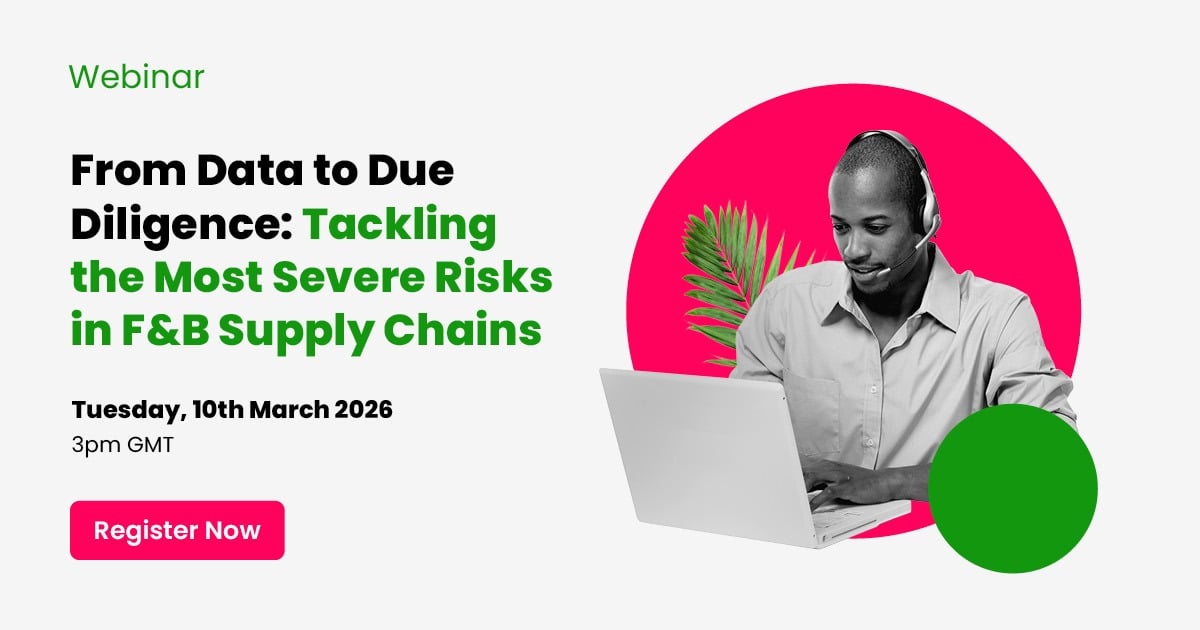Five Ways for Business Leaders to Advance Sustainable Procurement
As supply chains grow more complex, a new imperative is reshaping business strategies: sustainable procurement. But how can business leaders accelerate their sustainable procurement strategy – and what benefits could this unlock? We unpack this, drawing on our observations from our workshop at Sustainability Live 2024 in London.
A truly sustainable approach to procurement requires input and collaboration across the business, including leadership, and integration of sustainability into business strategies and policies. Embracing sustainability as a core business strategy, rather than treating it as an afterthought, demands considerable organisational change— but the rewards are significant, and your competitors may already be reaping the benefits.
Building the Business Case for Sustainable Procurement
The imperative for businesses to take responsibility for their social and environmental impacts, through sustainable procurement and other initiatives, is now well established. However, at Sedex Consulting we hear that it is still a challenge for companies to access the resources and internal buy-in they require to put policies into practice.
Communicating how sustainable procurement can help your company achieve its business goals – both directly and indirectly – is essential for securing these. We help our clients to categorise these benefits into financial, operational and reputational areas.
- Research conducted by the World Economic Forum has found significant positives for businesses that work to benefit society and the environment alongside achieving profitability. This included revenue uplifts of 5-20%, reduction in procurement costs by 9-16%, and an increase in brand value by 15-30%.
- The International Labour Organization has identified a strong correlation between workers’ increased well-being and productivity gains, which in turn lead to greater income and revenue generation.
The many benefits of sustainable procurement

Source: Sedex Consulting
These are just some of the benefits of sustainable procurement to support your conversations with stakeholders.
Business leaders’ biggest supply chain sustainability concerns
Sedex Consulting asked 70 business leaders in a variety of roles and industries (including CEOs, procurement specialists and legal counsel across finance, engineering, energy, and FMCG) what ESG risk they are most concerned about in their supply chains. The top four worries were:
- Scope 3 emissions
- Modern slavery
- Transparency and availability of data
- Emissions
Scope 3 emissions is an understandable concern, given the widely recognised challenges in data collection and calculations. These include a lack of supply chain emissions data, lack of standardised reporting frameworks, and the complex nature of supply chains.
With the speed and number of emerging legislations, from the German Supply Chain Due Diligence Act (LkSG) and EU Corporate Sustainability Due Diligence Directive (CSDDD) to the US Uyghur Forced Labor Prevention Act (UFLPA), it’s unsurprising that businesses also feel pressure regarding modern slavery in their supply chains.
The Consulting team is supporting multiple clients across these priorities. We’re helping companies understand which ESG laws they are in scope of, conducting gap assessments and developing roadmaps to guide businesses towards compliance, and developing human rights due diligence programmes.

Common challenges in sustainable procurement
We asked these business leaders to discuss the common challenges they face in their supply chains. Three key themes emerged:
1. Lack of internal support for integrating sustainability objectives into procurement and other operational functions – which translates into a lack of resources (budget, capacity, headcount) for sustainable procurement.
2. Complex nature of sustainable procurement and lack of relevant expertise act as bottle necks for businesses, hindering them in keeping up with the fast-paced regulatory environment and progressing their sustainable procurement strategies.
3. Lack of visibility and poor-quality data from supply chains prevent businesses from accurately measuring and reporting on sustainability performance. It’s difficult for companies to understand the full picture of their supply chain practices, identify and mitigate risks, and meet reporting requirements.
Through these open discussions, the extent of shared experiences and challenges faced in relation to sustainable procurement is clear across industries. While these concerns remain, these conversations reinforce to participants that they are not alone in their supply chain challenges.
Five solutions to help business leaders address these challenges
Whilst there’s no singular initiative or one-step solution to addressing these common challenges, our conversations with business leaders highlight these as the most helpful best practices:
- Plan out your business’s skills transition to identify and address gaps in ESG expertise across functions. Compliance training won’t be enough to help teams truly embed a sustainable approach – provide additional training to each department, tailored to their objectives and activities.
- Secure leadership alignment with procurement and sustainability teams when it comes to aims, priorities and ambition level. Raising awareness and building shared commitment to goals among leadership improves the flow of information, ensures cross-functional support, clarifies ownership and responsibilities, and helps to define ways of working.
- Foster true collaboration by breaking down isolated approaches between teams and companies. Instead of a regulatory race between businesses, by sharing data and learnings companies can harness their collective strengths to build the most effective solutions.
- Leverage scalable solutions to gather comparable and quality data, to support greater accuracy in reporting, as well as increasing the ease, speed and impact of key data insights. Sedex’s Platform, for example, automatically integrates supplier information into risk assessment and analytics to surface actionable insights on supply chain sustainability.
- Adopt a change management perspective. Organisational change in both processes and mindset is essential to fully integrate sustainable practices into business operations. It won’t be enough to have isolated procurement or sustainability teams and processes – meeting sustainable business goals requires business transformation. This evolution will help companies to access the financial, operational and reputational benefits outlined above, from energy efficiency to improved supply chain resilience through proactive risk management.
Learn more about the benefits your business could unlock, and how to build your sustainable procurement programme, with our Consulting experts.
Sedex Consulting works with businesses to develop strategic roadmaps and identify gaps in current procurement practices. We can support your organisation to build capacity through tailored training, align leadership on sustainability goals, gain visibility of supply chain risks, and reduce audit fatigue and reporting burden through using Sedex’s solutions.
Get in touch to discuss how we can empower your company’s sustainability goals.





